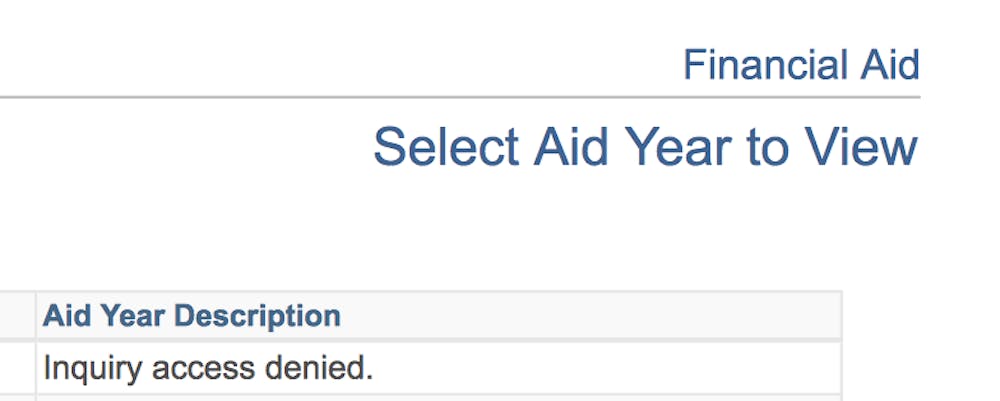Third-year Engineering student Courtney Baugh said her mom submitted the Free Application for Federal Student Aid in early October 2017, shortly after the application became available. She followed the University’s financial aid to-do list throughout the year, sending Student Financial Services everything it requested to process her financial aid award.
Yet, with only a little over two weeks until move-in day, Baugh had not received an award letter detailing the amount and type of aid she would earn for the school year.
Baugh was not alone. A quick scroll through Twitter and “What’s the Move” — a 1,700-person chat on GroupMe composed of mostly minority students — showed other University students asking the same question: Where’s my money?
“I didn’t know what would happen if I didn’t have the tuition”
Approximately 34 percent of undergraduates receive some form of financial aid. Oftentimes, this award is much more than just an electronic piece of paper. It’s a student’s ticket to remaining at the University.
Students were not alerted about the delayed receipt of their financial aid package, and many were worried about what the lag meant for the Aug. 22 tuition deadline.
“I was really concerned about getting [the aid] before August 22 because I didn’t know what would happen if I didn’t have the tuition,” Baugh said. She had heard she would be dropped from her classes, and she anticipated it would be difficult to re-enroll in them since they were already filled.
Until an email was sent to affected students on Aug. 1, the financial aid office had been mostly quiet, save for those who contacted the office directly to express their concerns. But even then, the explanations were vague, said fourth-year College student Aya Eltahir.
An email sent Aug. 1 told students who receive financial aid to help pay for college that their accounts would be in good standing until Sept. 12 and no financial holds would be placed on their account during that time period. This extension gives students an opportunity to receive their award and pay any tuition their aid doesn’t cover while also allowing them to make adjustments to their class schedules. Financial Aid Director Scott Miller said the office wanted to take the stress off of students ahead of time.
“We try to be proactive with the students,” Miller said.
There are a number of reasons the office is behind schedule for awarding aid this year, Miller said. Shortly before they were going to begin processing awards for returning students, they lost a staff member. Additionally, an increased number of students were selected for federal verification this year — meaning the student and the financial aid office have to take extra steps to verify the information on the student’s FAFSA application — which added another phase to the process.
The Financial Aid office, located in SFS, has 10 staff members who work with other offices in SFS to assemble aid packages. After the March 1 deadline for applying for aid, the office uses a combination of federal and state loans, work-study opportunities and grants to create a package that meets 100 percent of the financial need for students. While loans have to be repaid, grants do not.
The University is one of only two public universities that meets the full financial need of students. The University of North Carolina at Chapel Hill is the other.
Once a student’s financial aid package is complete, they receive a letter on SIS detailing their award. The office automatically accepts grant aid, but students can choose to accept or deny loans or work-study awards.
“If I don’t get this money, I might not be able to come”
For some students, the frustration and anxiety doesn’t stem from the financial aid office’s delay itself — but what that delay means.
“It's not necessarily about when we're going to get the money,” third-year Commerce student Latrell Lee said. “It's just the fact that we still haven't gotten our money, school starts in a little over two weeks and if I don't get this money, I might not be able to come.”
Lee is a low-income student who depends on financial aid to attend U.Va. He is a transfer student, and while he said he isn’t sure why he initially wanted to attend the University, the generous financial aid solidified his decision. Last year, Lee received a financial aid package that covered all of his expenses without him having to take out any loans. It arrived to his SIS account that May.
However, the uncertainty surrounding how much aid he will receive this year has him worried. His mom is unemployed and his dad is a self-employed contractor. He said he can’t afford to be hit with surprises when his financial aid package arrives, and if it isn’t as much as he’s expecting, it could jeopardize his future at U.Va.
“I'm usually not too critical about U.Va. financial aid because I recognize that of course they're people, too,” Lee said. “But when you're talking about other people's money — money that's being invested in somebody's future — you can't play with that.”
Eltahir said the entire financial aid process was “definitely nerve-racking,” especially given this year’s delay. For the past three years, her financial aid package has consisted mostly of U.Va.-based funds with a loan that’s about $1,000, which she typically received around late June or early July. When that didn’t happen this year, she became anxious.
“For me as a minority, low-income student, a lot of things are contingent upon the aid that I receive,” Eltahir said. “If I don't get what I need, it's going to be very difficult for me to even be at the University.”
She uses the refund check she receives after her tuition is paid for the basic necessities she needs as a college student — rent, books and groceries. After a number of emails and phone calls — “I think I was kind of being annoying,” she said — Eltahir received her award Aug. 7, still much later than usual. However, despite receiving her aid, she still felt the same about the situation.
“Even though I received it, my feelings haven't changed because a lot of my peers still don't have their aid,” Eltahir said.
Miller said the office has tried to address these concerns from students as it is made aware of them.
“We've tried to be responsive to students who have said, 'You know, I really need my award now,'” Miller said. “We're trying to take care of those as we learn about them.”
“I wish they had communicated earlier”
Baugh said she has had a good experience every time she’s contacted the financial aid office. Lee said he’s always considered the office to be timely and found this year to be very unusual. They, like many others, just wish the office had let students know what was going on.
“I wish they had communicated earlier to people,” Eltahir said. “I don't know if this just due to my limited perspective and just the people around me, but I didn't feel that there was any type of urgency to explain the situation until a few weeks back when everyone was like, 'Did anyone get their financial aid?'”
It makes sense that they were behind schedule — they had a staff shortage, said Lee. But students didn’t know they had lost a staff member and they were working to complete more federal verifications. He said that if the office had a “hunch” that something wasn’t going to go right, students should have been told immediately.
“I wish he would've just told somebody,” Lee said. “That's all we've been wanting to know for the past few weeks. We just wanted to know what was going on. Why haven't we gotten our money?”







